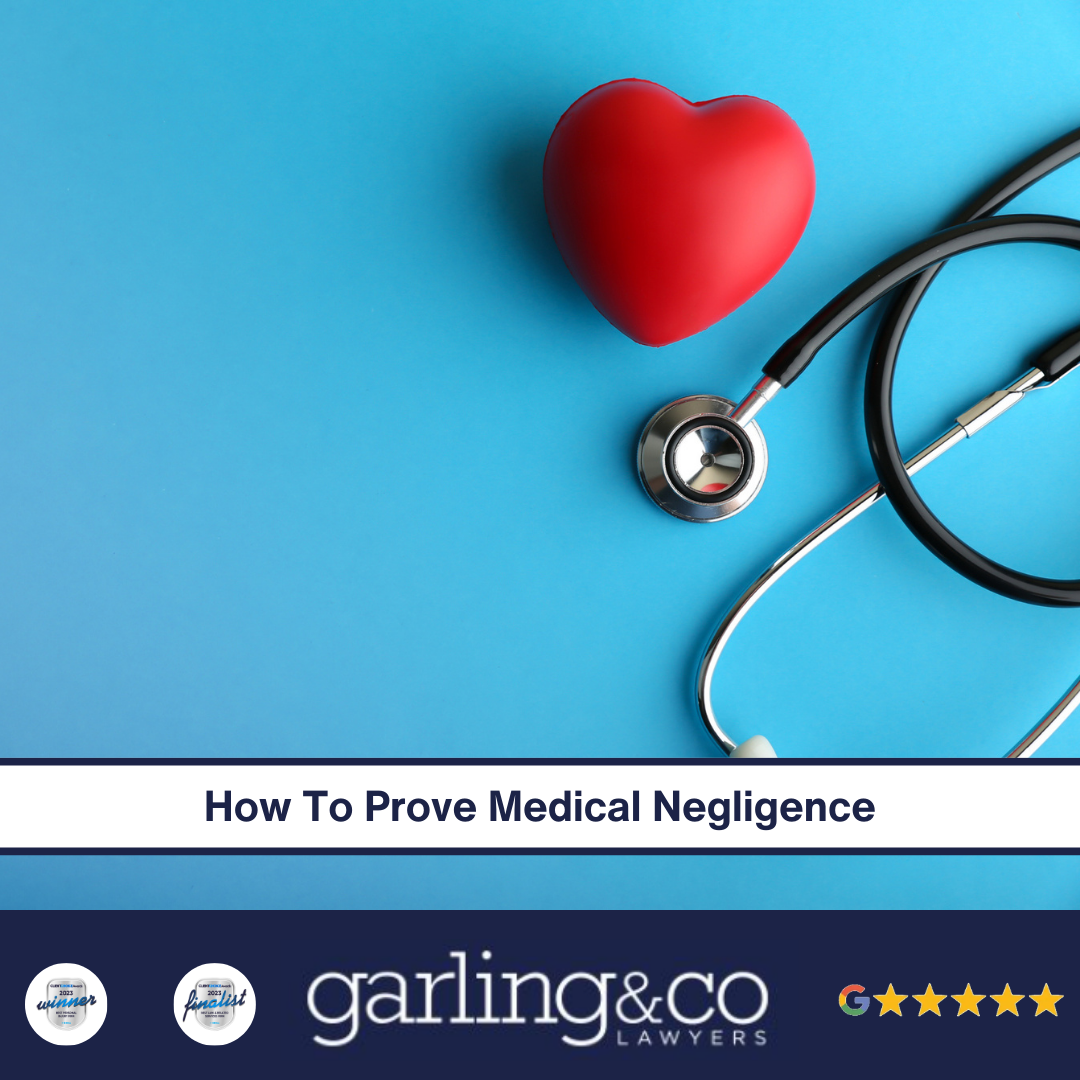
If you think you have a medical negligence claim but are not sure if you satisfy the negligence and causation test you should contact Garling & Co Lawyers for a free case assessment.
What is medical negligence and is there a difference to medical malpractice?
The terms medical negligence and medical malpractice describe the same type of claim. In Australia we use the term Medical Negligence. While Medical Malpractice is used in the USA.
Both terms describe the same thing, that being:
- An act or omission by healthcare providers. This includes doctors, nurses or midwives that causes an injury to a patient or someone under their care, and;
- The act or omission represents a departure from reasonable standards of care.
How do I prove medical negligence?
Below are 7 ways to prove medical negligence:
Duty Of Care
To prove medical negligence, you first need to establish that a healthcare provider or medical facility owed you a duty of care. This is a requirement for bringing a medical negligence claim. You do not have legal standing to seek compensation from a healthcare provider or medical facility if you cannot establish that they owe you a duty of care.
A duty of care normally arises from the doctor-patient relationship. Duty of care is the responsibility of the healthcare provider or medical facility. They must provide care and treatment to a patient with the exercise of reasonable care and skill as to ensure your safety and well-being as a patient.
This duty of care extends to the initial examination, management, diagnosis, medical and surgical treatment and referral for further management of a patient. Medical facilities such as hospitals or medical centres also owe patients a duty of care. If the allegedly negligence treatment was provided at the facility and/or by healthcare professionals who are employed by those facilities or act as servant or agents of the facility.
Breach of duty of care
Once a duty of care has been established, the next step is determining whether the healthcare provider or medical facility breached their duty of care to you, the patient. The question of whether a healthcare provider or medical facility breached their duty of care to a patient is ultimately subject to determination by the courts. However, before a court can determine the question of breach of duty of care, the applicable standard of care must be ascertained.
Standard of care
The standard of care is determined by ascertaining if the services provided to the patient were provided in a manner that was consistent with the accepted standard of care at that time. This is determined by having regard to peer professional opinion in Australia as to whether the healthcare provider acted in a manner that was widely accept as competent professional practice at that time.
For example, if it is alleged that an obstetrician breached his or her duty of care by failing to provide reasonable care to a patient in 2001, the standard of care applicable is the one that was widely accepted by peer professional opinion in Australia as competent professional practice in 2001.
Suffering an injury or an unsatisfactory prognosis or treatment outcome is not in, or of, itself proof of negligence. A healthcare provider is not liable in negligence if he or she can establish that they acted in a manner that was consistent with competent professional practice as widely accepted by peer healthcare providers in Australia at the time that the medical service was provided. Usually, the courts are assisted by expert medical opinion on the standard of care applicable. Professional opinions cannot be relied on if the court considers the opinion to be irrational. Medical expert opinion usually also identifies the wrongful acts or omissions that represent departures from competent professional practice.
Failure To Warn
The standard of care set out above does not apply to failure to warn claims. Failure to warn claims arise when the plaintiff alleges that the medical professional omitted relevant information about treatments and practices that has caused them harm. Failure to warn includes the omission of any advice, information, or warning about a procedure or a treatment. A medical professional must advise patients of the risk of treatment. The type of information that should be given to the patient include the following;
- Extent and severity of the potential injury
- Likelihood of injury occurring
- Necessity of the operation
- Alternative treatments
- Fears or concerns of the patient that are known to the practitioner.
The medical professional must provide such advice, information, or warning in a manner that the patient can understand. For example, if a patient did not speak English, or could not understand it, the practitioner would need to be satisfied that they have successfully conveyed the information and risks of the surgery to the patient.
To successfully argue the failure to warn, the plaintiff needs to prove whether the omission of any advice, information or warning caused the patient any harm. For example, if the patient wasn’t advised about an alternative surgery that had more risks and a higher chance of failing, it would be difficult to prove that the inclusion of this information would have resulted in the patient electing to have any different treatment.
An expert medical opinion needs to be obtained in any medical negligence claim to prove breach of duty of care.
Negligent Treatment
Negligent treatment is one where the medical professional’s actions or omissions cause harm or injury to the patient during treatment. Examples of this include:
- Botched surgery
- Misdiagnosis
- Medication errors
- Failure to refer a patient to a specialist
- Misreporting test results
A medical professional is not negligent if they acted in a manner that was widely accepted at the time of the treatment as competent medical practice. This means that a similar doctor would not have acted differently provided with the same information, and therefore the medical professional’s actions or omissions cannot be negligent. To prove this, an expert opinion should be consulted. The expert will testify on whether the medical professional acted within competent professional practice given the circumstances of the case.
To have breached the duty of care in a medical negligence case, the medical professional must have acted outside of peer professional opinion, and such an action or omission led to directly to harm or injury to the patient.
Causation
While it is necessary to prove a breach of duty of care, it is also necessary to prove that such a breach was the cause of harm or injury to the patient. In medical negligence cases the plaintiff bears the onus of proof and needs to prove causation.
Causation is the requirement that negligence is a necessary condition for the harm occurring. It is the notion that if there was no negligence, the harm would have been avoided. If the medical professional’s negligence materially contributes to the injury, then there is causation. If there are multiple factors contributing to a patient’s harm, as long as one of the factors is caused by the medical professional’s negligence, factual causation is met.
Damages
Depending on the extent and severity of injuries, a successful plaintiff may be able to claim compensation for:
- Past and future medical expenses
- Past loss of income
- Future loss of income and/or loss of earning capacity
- Past care
- Future care
- Pain and suffering
- Loss of enjoyment of life.
How hard is it to prove medical negligence?
It is very difficult to prove Medical Negligence. In Medical Negligence cases, there is a high standard of proof, involving complicated medical documents and reports and expert opinions. That is why it is important to consult an accredited specialist to assist you in your medical negligence claim.
What happens once I can prove medical negligence?
To prove medical negligence you need to establish that the medical professional or hospital breached their duty of care. This will always involve obtaining expert medical opinion related to the failure or omission of the medical practitioner or hospital which caused your injury.
If you do have an arguable claim for medical negligence, you are entitled to claim damages, which is a form of compensation. Damages a payable in respect of;
- Payment for pain and suffering loss of enjoyment of life
- Payment of past and future medical treatment
- Payment in past and future loss of income and for
- Payment of care past and future care and assistance.
Damages are payable as a once off lump sum amount to compensate you for both past and future losses and it is a once-off payment of compensation. You are not entitled to return and claim any further compensation once the amount has been agreed or determined by a court. The majority of claims for medical negligence need to be commenced in the District or Supreme Court of NSW and it takes between one and two years from the commencement of the claim for it to be settled either by way of negotiation with the insurance company or a determination by a judge.
When do I contact a lawyer?
If you think you have a claim for medical negligence you need an Accredited Specialist in Personal Injury Law to act on your behalf.
Compensation claims arising from injuries caused by medical negligence, also known as medical malpractice, are highly complex and to achieve the best outcome, you need the support of an accredited specialist in personal injury law. Victims of medical negligence face life-changing injuries and disabilities, that at their worst are catastrophic, but all significantly impact all aspects of their lives, their quality of life and even the lives of their families. We’ve successfully helped people just like you to receive the financial compensation they deserve due to the negligence of doctors, hospitals, nurses, midwives and allied health professionals including physiotherapists.
We understand that living with an injury or a serious medical condition usually involves endless medical appointments and makes it difficult to even perform basic activities of daily living. You may suspect that your medical condition or disability were caused by negligence on the part of your treating doctors but do not have the time to investigate those suspicions. You might not know which avenues to pursue to investigate your suspicious or understand conduct that amounts to medical negligence.
Although information is widely available these days, it might be difficult for you to find information that describes your individual circumstances. This makes it difficult for you to determine if the circumstances leading to your injuries amount to medical negligence. Similarly, you might not understand your legal rights and you might not realise that you are entitled to compensation for your injuries. We have included a selection of medical negligence cases that highlight the highly diverse nature of medical negligence claims and some of the compensation amounts that we are able to secure for those claims.
Our selection of medical negligence cases studies will help you understand the following:
-
- The different types of medical negligence
- If your injuries are likely to arise from medical negligence
- The injuries and losses that are compensable
- How compensation is calculated
At Garling & Co, we work on a no win no fee basis to ensure that everyone has the means to fight their legal case. To learn if you are eligible, please fill out our free, no-obligation confidential case assessment form. We will respond within 24 hours alternatively, you can give our friendly team a call today at 02 8329 9500.












